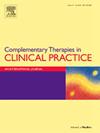身心锻炼对脑瘫儿童的影响--系统回顾和荟萃分析。
IF 2.2
3区 医学
Q2 INTEGRATIVE & COMPLEMENTARY MEDICINE
引用次数: 0
摘要
背景和目的:越来越多的研究调查了身心锻炼在治疗脑瘫(CP)儿童方面的疗效。然而,这些研究的结果并不一致。本研究的目的是评估身心锻炼对脑瘫儿童的影响,以提供更确凿的结果:从开始到 2024 年 5 月,在 PubMed、Cochrane、Embase、Web of Science 和 Ovid 数据库中进行了全面检索。一名研究人员提取数据,包括第一作者、研究类型、国家、发表年份、人群、年龄、样本大小、干预细节和结果,并由另一名研究人员核实数据的准确性。使用Review Manager 5.4(RevMan 5.4)和StataNow/MP 18.5软件对纳入的研究进行分析,使用漏斗图检查发表偏倚,并通过敏感性分析评估结果的稳定性:荟萃分析共纳入了 6 项符合条件的研究,包括 173 名患者。荟萃分析结果表明,心身锻炼可改善CP患儿的平衡功能(SMD = 0.48,P = 0.006)。心身锻炼对CP患儿行走功能的影响无明显差异(SMD = -0.23,P = 0.58):结论:与常规护理和康复训练相比,心身锻炼可为改善CP患儿的平衡功能提供一种安全、便捷的方法,但对CP患儿的行走功能没有统计学意义上的明显有益影响:CRD42024534257。本文章由计算机程序翻译,如有差异,请以英文原文为准。
Effects of mind-body exercise in children with cerebral palsy—A systematic review and meta-analysis
Background and purpose
An increasing number of studies have investigated the efficacy of mind-body exercise in the treatment of children with cerebral palsy (CP). However, the findings of these researches have produced inconsistent results. The objective of this study was to evaluate the effects of mind-body exercise on children with CP in order to provide more conclusive results.
Materials and methods
A comprehensive search was conducted in PubMed, Cochrane, Embase, Web of Science, and Ovid databases from inception to May 2024. One researcher extracted the data, including first author, study type, country, year of publication, population, age, sample size, intervention details and outcomes, accuracy was verified by a second researcher. The included studies were analyzed using Review Manager 5.4 (RevMan 5.4) and StataNow/MP 18.5 software, with publication bias examined using funnel plots, and result stability assessed through sensitivity analysis.
Results
A total of six eligible studies, comprising 173 patients, were included in the meta-analysis. The results of the meta-analysis indicated that mind-body exercise can improve balance function in children with CP (SMD = 0.48, P = 0.006). There was no significant difference in the effect of mind-body exercise on walking function in children with CP (SMD = −0.23, P = 0.58).
Conclusion
Compared with routine care and rehabilitation, mind-body exercise may provide a safe and convenient approach to improving balance functions in children with CP, but showed no statistically significant beneficial effects on walking in children with CP.
Prospero registration number
CRD42024534257.
求助全文
通过发布文献求助,成功后即可免费获取论文全文。
去求助
来源期刊

Complementary Therapies in Clinical Practice
INTEGRATIVE & COMPLEMENTARY MEDICINE-
CiteScore
6.30
自引率
6.70%
发文量
157
审稿时长
40 days
期刊介绍:
Complementary Therapies in Clinical Practice is an internationally refereed journal published to meet the broad ranging needs of the healthcare profession in the effective and professional integration of complementary therapies within clinical practice.
Complementary Therapies in Clinical Practice aims to provide rigorous peer reviewed papers addressing research, implementation of complementary therapies (CTs) in the clinical setting, legal and ethical concerns, evaluative accounts of therapy in practice, philosophical analysis of emergent social trends in CTs, excellence in clinical judgement, best practice, problem management, therapy information, policy development and management of change in order to promote safe and efficacious clinical practice.
Complementary Therapies in Clinical Practice welcomes and considers accounts of reflective practice.
 求助内容:
求助内容: 应助结果提醒方式:
应助结果提醒方式:


